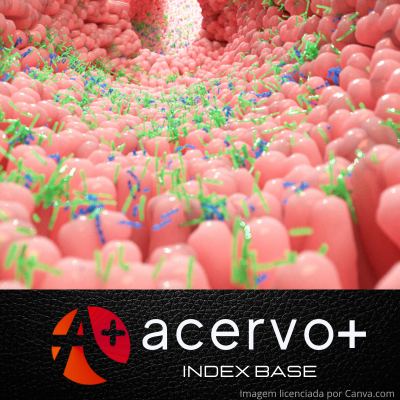O impacto sistêmico das alterações da microbiota intestinal em doenças autoimunes
##plugins.themes.bootstrap3.article.main##
Resumo
Objetivo: Elucidar as repercussões que as alterações da microbiota intestinal acarretam no processo fisiopatológico das doenças autoimunes. Revisão bibliográfica: A microbiota é o conjunto de microorganismos que vivem nos intestinos humanos, representada por trilhões de bactérias, figurando número 10 vezes maior do que a quantidade de células humanas que compõem o corpo humano. Essa entidade estabelece complexas relações com o organismo humano, seja produzindo substâncias diversas; seja competindo por recursos, contra potenciais patógenos; ou seja, interagindo com o sistema imunológico. Nesse contexto, alterações dessa microbiota podem causar desequilíbrios nessas complexas interações, podendo trazer prejuízo ao organismo, sendo demonstrado, neste artigo, sobre o pano de fundo de doenças como diabetes mellitus tipo 1, artrite reumatóide, esclerose múltipla, lúpus eritematoso sistêmico e doença celíaca. Considerações finais: Investigar e compreender melhor essas relações entre microbiota e doenças autoimunes abre caminho para novas estratégias de tratamento e de prevenção de doenças, potencialmente melhorando a qualidade de vida dos pacientes afetados por essas condições complexas.
##plugins.themes.bootstrap3.article.details##
Copyright © | Todos os direitos reservados.
A revista detém os direitos autorais exclusivos de publicação deste artigo nos termos da lei 9610/98.
Reprodução parcial
É livre o uso de partes do texto, figuras e questionário do artigo, sendo obrigatória a citação dos autores e revista.
Reprodução total
É expressamente proibida, devendo ser autorizada pela revista.
Referências
2. AN J, et al. The role of intestinal mucosal barrier in autoimmune disease: A potential target. Frontiers in Immunology, 2022; 13: 871713.
3. BÄCKHED F, et al. Dynamics and stabilization of the human gut microbiome during the first year of life. Cell host & microbe, 2015; 17(6): 852.
4. BELKAID Y e HAND TW. Role of the Microbiota in immunity and inflammation. Cell, 2014; 157(1): 121–141.
5. BRUSCA SB, et al. Microbiome and mucosal inflammation as extra-articular triggers for rheumatoid arthritis and autoimmunity. Current Opinion in Rheumatology, 2014; 26(1): 101–107.
6. CHANG C e LIN H. Dysbiosis in gastrointestinal disorders. Best practice & research. Clinical gastroenterology, 2016; 30(1): 3–15.
7. CHEN J e VITETTA L. Intestinal dysbiosis in celiac disease: Decreased butyrate production may facilitate the onset of the disease. Proceedings of the National Academy of Sciences of the United States of America, 2021; 118(41): 2113655118.
8. CHRISTOVICH A e LUO XM. Gut Microbiota, leaky gut, and autoimmune diseases. Frontiers in Immunology, 2022; 13: 946248.
9. CRISPIM J. Sistema Nervoso e Doenças Autoimunes: uma revisão. Revista Inova Saúde, 2024; 14(5): 2117–2460.
10. DE LUCA F e SHOENFELD Y. The microbiome in autoimmune diseases. Clinical and Experimental Immunology, 2019; 195(1): 74–85.
11. DE OLIVEIRA GLV, et al. Intestinal dysbiosis and probiotic applications in autoimmune diseases. Immunology, 2017; 152: 1-12.
12. JIAO Y, et al. Crosstalk between gut Microbiota and innate immunity and its implication in autoimmune diseases. Frontiers in Immunology, 2020; 11: 282.
13. JOHNSON BM, et al. Gut microbiota differently contributes to intestinal immune phenotype and systemic autoimmune progression in female and male lupus-prone mice. Journal of Autoimmunity, 2020; 108(102420): 102420.
14. KIM JW, et al. Recent advances in our understanding of the link between the intestinal Microbiota and systemic lupus erythematosus. International journal of molecular sciences, 2019; 20(19): 4871.
15. KINASHI Y e HASE K. Partners in leaky gut syndrome: Intestinal dysbiosis and autoimmunity. Frontiers in immunology, 2021; 12: 673708.
16. KNIP M e SILJANDER H. The role of the intestinal microbiota in type 1 diabetes mellitus. Nature Reviews. Endocrinology, 2016; 12(3): 154–167.
17. LEONARD MM, et al. Microbiome signatures of progression toward celiac disease onset in at-risk children in a longitudinal prospective cohort study. Proceedings of the National Academy of Sciences of the United States of America, 2021; 118(29): 2020322118.
18. LEVY M, et al. Dysbiosis and the immune system. Nature Reviews. Immunology, 2017; 17(4): 219–232.
19. LOPEZ RN, et al. Differences in gut microbiome profile between healthy children and children with inflammatory bowel disease and/or autoimmune liver disease: A case-control study. Pathogens, 2023; 12(4): 585.
20. MOUSA WK, et al. Microbial dysbiosis in the gut drives systemic autoimmune diseases. Frontiers in immunology, 2022; 13: 906258.
21. MIYAUCHI E, et al. The impact of the gut microbiome on extra-intestinal autoimmune diseases. Nature Reviews Immunology, 2023; 23(1): 9–23.
22. OPAZO MC, et al. Intestinal Microbiota influences non-intestinal related autoimmune diseases. Frontiers in microbiology, 2018; 9: 432.
23. PELÁEZ JP, et al. Relación de la microbiota intestinal con enfermedades autoinmunes. Revista Vive, 2023; 6 (16): 142–153.
24. ROGERS GB. Germs and joints: the contribution of the human microbiome to rheumatoid arthritis. Nature medicine, 2015; 21(8): 839–841.
25. VATANEN T, et al. Variation in microbiome LPS immunogenicity contributes to autoimmunity in humans. Cell, 2016; 165(4): 1551.
26. WU WJH, et al. Intestinal microbes in autoimmune and inflammatory disease. Frontiers in Immunology, 2020; 11: 597966.
27. WU X, et al. Gastrointestinal microbiome and gluten in celiac disease. Annals of medicine, 2021; 53(1): 1797–1805.

